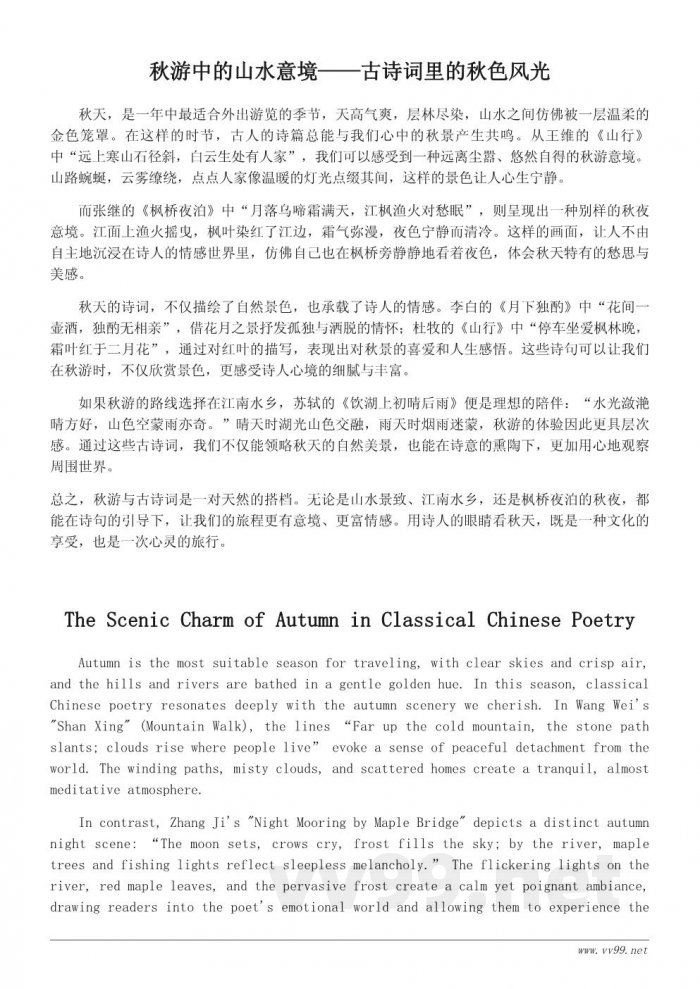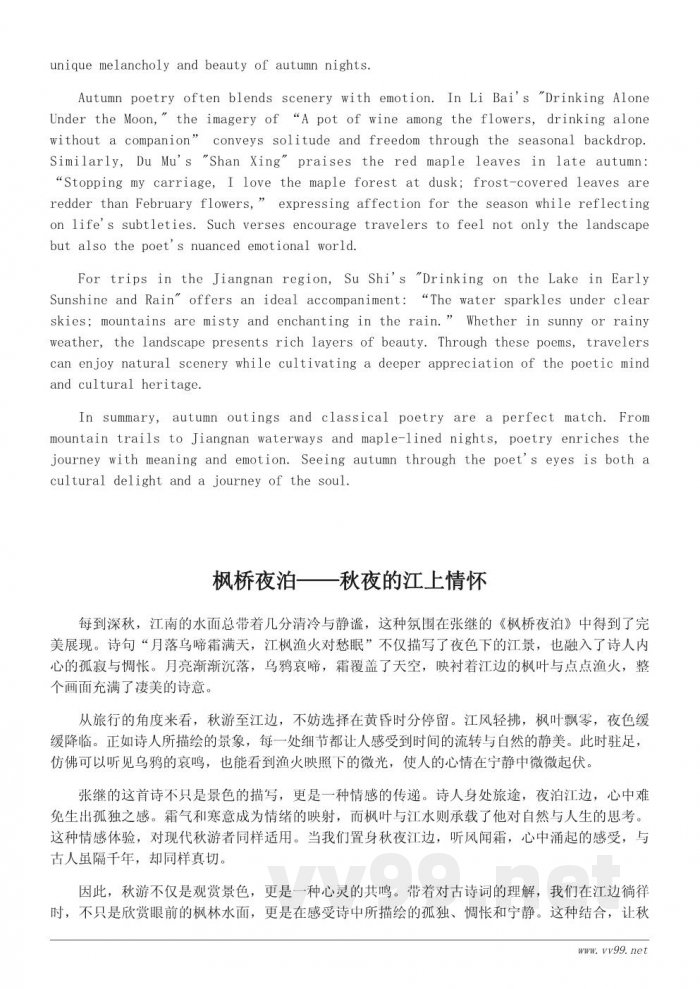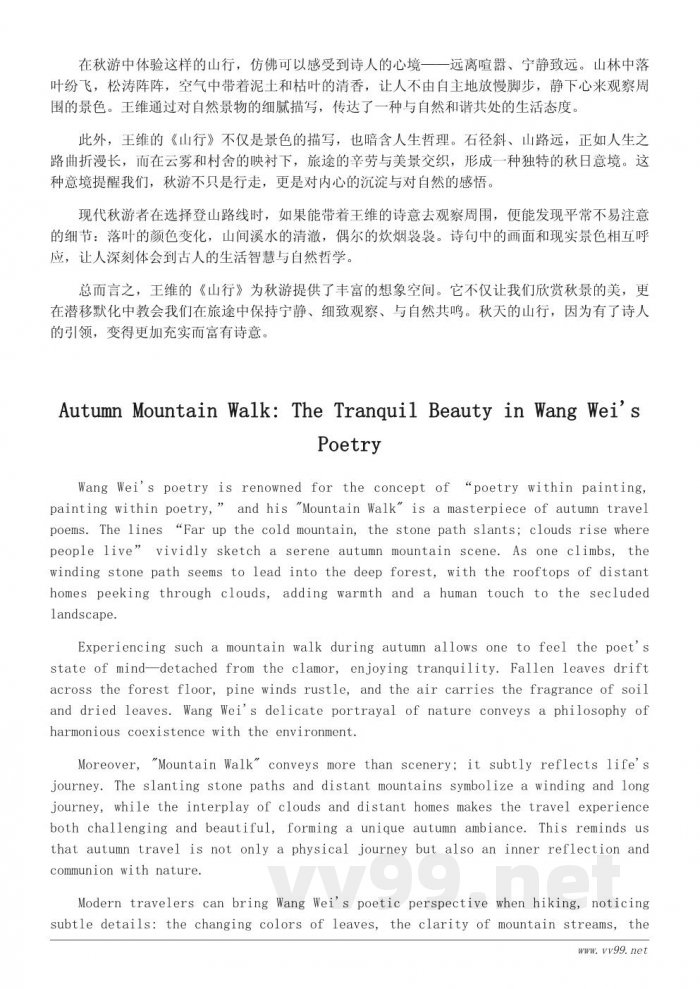秋游中的山水意境——古诗词里的秋色风光
秋天,是一年中最适合外出游览的季节,天高气爽,层林尽染,山水之间仿佛被一层温柔的金色笼罩。在这样的时节,古人的诗篇总能与我们心中的秋景产生共鸣。从王维的《山行》中“远上寒山石径斜,白云生处有人家”,我们可以感受到一种远离尘嚣、悠然自得的秋游意境。山路蜿蜒,云雾缭绕,点点人家像温暖的灯光点缀其间,这样的景色让人心生宁静。
而张继的《枫桥夜泊》中“月落乌啼霜满天,江枫渔火对愁眠”,则呈现出一种别样的秋夜意境。江面上渔火摇曳,枫叶染红了江边,霜气弥漫,夜色宁静而清冷。这样的画面,让人不由自主地沉浸在诗人的情感世界里,仿佛自己也在枫桥旁静静地看着夜色,体会秋天特有的愁思与美感。
秋天的诗词,不仅描绘了自然景色,也承载了诗人的情感。李白的《月下独酌》中“花间一壶酒,独酌无相亲”,借花月之景抒发孤独与洒脱的情怀;杜牧的《山行》中“停车坐爱枫林晚,霜叶红于二月花”,通过对红叶的描写,表现出对秋景的喜爱和人生感悟。这些诗句可以让我们在秋游时,不仅欣赏景色,更感受诗人心境的细腻与丰富。
如果秋游的路线选择在江南水乡,苏轼的《饮湖上初晴后雨》便是理想的陪伴:“水光潋滟晴方好,山色空蒙雨亦奇。”晴天时湖光山色交融,雨天时烟雨迷蒙,秋游的体验因此更具层次感。通过这些古诗词,我们不仅能领略秋天的自然美景,也能在诗意的熏陶下,更加用心地观察周围世界。
总之,秋游与古诗词是一对天然的搭档。无论是山水景致、江南水乡,还是枫桥夜泊的秋夜,都能在诗句的引导下,让我们的旅程更有意境、更富情感。用诗人的眼睛看秋天,既是一种文化的享受,也是一次心灵的旅行。
The Scenic Charm of Autumn in Classical Chinese Poetry
Autumn is the most suitable season for traveling, with clear skies and crisp air, and the hills and rivers are bathed in a gentle golden hue. In this season, classical Chinese poetry resonates deeply with the autumn scenery we cherish. In Wang Wei's "Shan Xing" (Mountain Walk), the lines “Far up the cold mountain, the stone path slants; clouds rise where people live” evoke a sense of peaceful detachment from the world. The winding paths, misty clouds, and scattered homes create a tranquil, almost meditative atmosphere.
In contrast, Zhang Ji's "Night Mooring by Maple Bridge" depicts a distinct autumn night scene: “The moon sets, crows cry, frost fills the sky; by the river, maple trees and fishing lights reflect sleepless melancholy.” The flickering lights on the river, red maple leaves, and the pervasive frost create a calm yet poignant ambiance, drawing readers into the poet's emotional world and allowing them to experience the unique melancholy and beauty of autumn nights.
Autumn poetry often blends scenery with emotion. In Li Bai's "Drinking Alone Under the Moon," the imagery of “A pot of wine among the flowers, drinking alone without a companion” conveys solitude and freedom through the seasonal backdrop. Similarly, Du Mu's "Shan Xing" praises the red maple leaves in late autumn: “Stopping my carriage, I love the maple forest at dusk; frost-covered leaves are redder than February flowers,” expressing affection for the season while reflecting on life's subtleties. Such verses encourage travelers to feel not only the landscape but also the poet's nuanced emotional world.
For trips in the Jiangnan region, Su Shi's "Drinking on the Lake in Early Sunshine and Rain" offers an ideal accompaniment: “The water sparkles under clear skies; mountains are misty and enchanting in the rain.” Whether in sunny or rainy weather, the landscape presents rich layers of beauty. Through these poems, travelers can enjoy natural scenery while cultivating a deeper appreciation of the poetic mind and cultural heritage.
In summary, autumn outings and classical poetry are a perfect match. From mountain trails to Jiangnan waterways and maple-lined nights, poetry enriches the journey with meaning and emotion. Seeing autumn through the poet's eyes is both a cultural delight and a journey of the soul.
枫桥夜泊——秋夜的江上情怀
每到深秋,江南的水面总带着几分清冷与静谧,这种氛围在张继的《枫桥夜泊》中得到了完美展现。诗句“月落乌啼霜满天,江枫渔火对愁眠”不仅描写了夜色下的江景,也融入了诗人内心的孤寂与惆怅。月亮渐渐沉落,乌鸦哀啼,霜覆盖了天空,映衬着江边的枫叶与点点渔火,整个画面充满了凄美的诗意。
从旅行的角度来看,秋游至江边,不妨选择在黄昏时分停留。江风轻拂,枫叶飘零,夜色缓缓降临。正如诗人所描绘的景象,每一处细节都让人感受到时间的流转与自然的静美。此时驻足,仿佛可以听见乌鸦的哀鸣,也能看到渔火映照下的微光,使人的心情在宁静中微微起伏。
张继的这首诗不只是景色的描写,更是一种情感的传递。诗人身处旅途,夜泊江边,心中难免生出孤独之感。霜气和寒意成为情绪的映射,而枫叶与江水则承载了他对自然与人生的思考。这种情感体验,对现代秋游者同样适用。当我们置身秋夜江边,听风闻霜,心中涌起的感受,与古人虽隔千年,却同样真切。
因此,秋游不仅是观赏景色,更是一种心灵的共鸣。带着对古诗词的理解,我们在江边徜徉时,不只是欣赏眼前的枫林水面,更是在感受诗中所描绘的孤独、惆怅和宁静。这种结合,让秋游充满了文化的厚度,也让心灵获得片刻的沉淀。
Mooring by Maple Bridge: Autumn Nights on the River
In late autumn, the rivers of Jiangnan exude a calm and slightly chilly atmosphere, perfectly captured in Zhang Ji's "Night Mooring by Maple Bridge." The lines “The moon sets, crows cry, frost fills the sky; by the river, maple trees and fishing lights reflect sleepless melancholy” depict not only the night scenery but also the poet's inner solitude and melancholy. As the moon sinks, crows caw, frost blankets the sky, and the maple trees and scattered fishing lights along the river create a poignantly beautiful scene.
For travelers, visiting the riverside at dusk can be especially rewarding. A gentle autumn breeze stirs the falling leaves, and night slowly descends. Every detail of the landscape mirrors the passage of time and the quiet beauty of nature. Standing there, one almost hears the distant cries of crows and sees the subtle glow of fishing fires, letting the heart gently oscillate between serenity and reflection.
Zhang Ji's poem is more than a depiction of scenery; it conveys deep emotion. The poet, mooring along the river during his journey, naturally feels solitude. The frost and chill reflect his mood, while the maple leaves and flowing water carry his contemplation of nature and life. Modern autumn travelers can relate to this feeling: standing by the riverside on an autumn night, hearing the wind and sensing the frost, one feels a vivid connection across the centuries with the poet.
Thus, autumn excursions are not only about observing the scenery but also about emotional resonance. With an understanding of classical poetry, wandering by the river in autumn becomes a cultural experience, where one appreciates not only the maple trees and shimmering waters but also the solitude, melancholy, and tranquility depicted in the poem. This combination enriches the journey and offers a moment of quiet reflection for the soul.
小提示:上面此文档内容仅展示完整文档里的部分内容, 若需要下载完整文档请 点击免费下载完整文档 。





